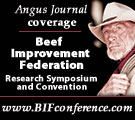WTO Final Ruling on COOL
WTO releases final figure for retaliatory tariffs over U.S. COOL rule.
The World Trade Organization (WTO) Dec. 7 authorized Canada and Mexico to assess more than $1 billion in retaliatory tariffs on U.S. products, closing the long-running dispute over the U.S. country-of-origin labeling (COOL) rule. National Cattlemen’s Beef Association (NCBA) President Philip Ellis said that immediate action was needed by the Senate, or retaliation against U.S. exports would soon follow.
“The WTO ruled that the U.S. COOL rule has cost Canadian and Mexican livestock producers in excess of $1 billion over the past seven years, and has authorized that amount in retaliatory tariffs,” said Ellis. “If the Senate does not act, U.S. beef exports will face a 100% tariff in these countries, severely diminishing about $2 billion of beef exports annually.”
This announcement was the final step in a WTO dispute that had been ongoing for more than seven years. Despite efforts by the USDA to amend the rule, the WTO repeatedly ruled that the U.S. COOL rule discriminated against imported livestock in violation of our trade agreements. The loss of the Canadian and Mexican markets was expected to cost U.S. beef producers 10¢ per pound immediately.
Canada announced a comprehensive list of products they intended to retaliate against, including not only U.S. beef and pork, but grains, fruits and manufactured goods. Under WTO retaliation procedures, Canada and Mexico could also carousel the products they retaliate against, choosing to target certain products during parts of the year. That would maximize the damage to the entire U.S. economy.
Without legislation to repeal COOL, retaliation would have begun in mid-December. Learn more about U.S. legislation regarding COOL in the "Omnibus Legislation Affects Cattlemen" article on the front page of this Angus Beef Bulletin EXTRA.

Editor’s Note: This article is adapted from a release provided by NCBA.




